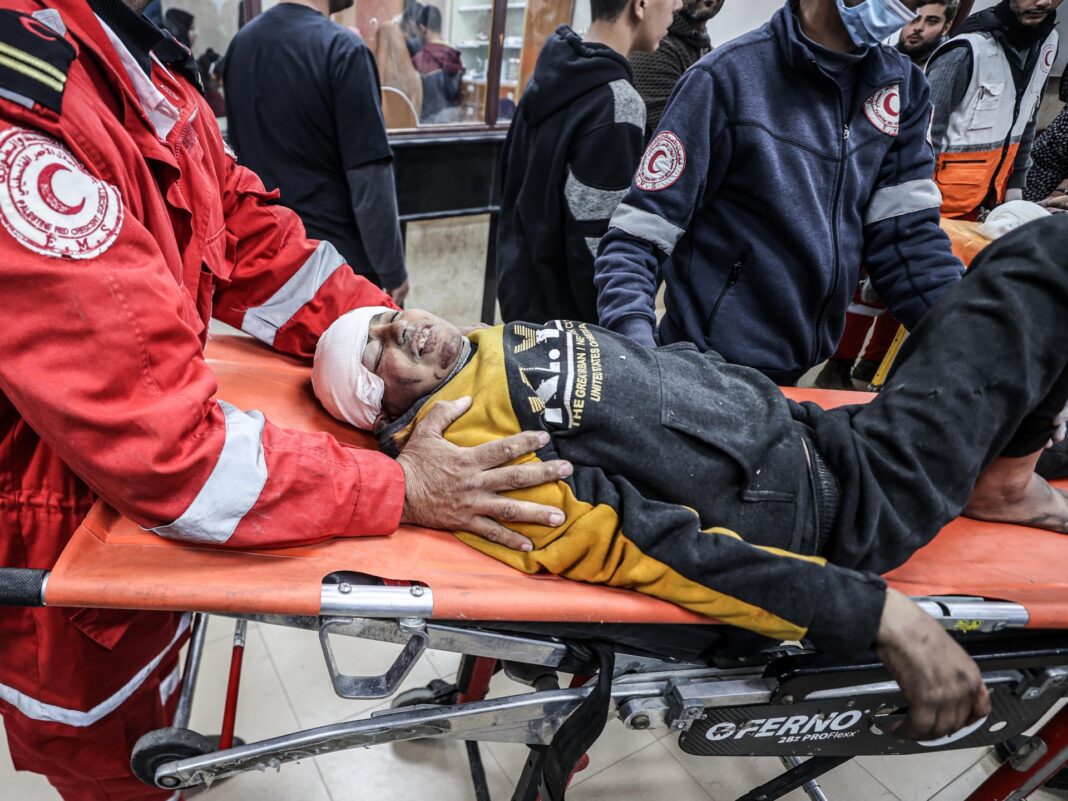Khan Younis, Gaza – Lying on a bed at the European Hospital in southern Gaza, hidden behind bandages that enveloped his disfigured face, five-year-old Ahmed Abu Zariaan remained unidentified for more than a week.
The injured boy was one of a growing number of children in the war-torn enclave to be registered as “unknown”, or under the acronym WCNSF – wounded child, no surviving family.
Ahmed’s family was wiped out in an Israeli air raid as they travelled southwards along Salah al-Din Street, a route Israel designated for safe passage from northern Gaza, in early November.
Heeding the Israeli army’s order for residents in the northern part of the enclave to evacuate to the south, the family of five left Beit Hanoon on a donkey cart and headed for Rafah, on the border with Egypt.
A strike targeting a nearby house along the way killed the whole family but spared the five-year-old. Nour Lafi, a 28-year-old nurse at the European Hospital, said the boy was in intensive care for two weeks after sustaining severe injuries and burns.
“His face was not visible at all and no one recognised him. He was nameless,” she said. “None of his family were there. I could hear him moaning in pain. We tried to talk to him, but he wouldn’t say a word.”

The boy was recognised 10 days later by his grandmother.
UNICEF, the UN agency for the protection of children, estimates that at least 17,000 children in the Gaza Strip are unaccompanied or have been separated from their immediate relatives since the beginning of the conflict on October 7 – about 1 percent of the overall displaced population of 1.7 million people.
In Gaza, where Israel’s brutal war has passed the four-month mark, parents have long resorted to writing their children’s names on their bodies so they can be identified if killed or injured. When no indication of their identity is immediately available, hospitals send out alerts on social media networks in the hope that relatives come forward.
Yet, sometimes a child’s injuries are so severe that their own families would struggle to recognise them.
In the course of the conflict, NGO Save the Children found, more than 10 children a day lose one or both of their legs.
‘Missiles destroy people outside and inside’
Samira Abu Zariaan, 60, is still in shock that her daughter was killed but she has taken on caring for her grandson, whose physical and psychological wounds are life-altering.
“His emotional state is still very difficult,” Samira told Al Jazeera. “He hasn’t talked much. His voice trembles with fear. He’s scared of any sounds near him.”
Ahmed has asked about his mother, but Samira could not bring herself to tell him the truth. “He doesn’t know she was killed. I told him she’s injured and needs to rest.”
“I don’t know how Ahmed will overcome his shock. These missiles destroy people outside and inside,” she said. “He turned from a cheerful, impish, chattering child to a silent, still child.”
The UN estimates that some 40 percent of the people in Gaza have lost their identification cards and other documents, making it harder to identify unaccompanied children and reunite them with their families.
“Forced separation exposes children to various dangers and heightened risks of exploitation, neglect, and abuse,” Ammar Ammar, spokesperson for UNICEF, told Al Jazeera.
A 2022 assessment by Save the Children found that the psychosocial well-being of children in Gaza had reached alarming levels due to protracted conflicts, a global pandemic and a crippling blockade.
The needs are now “unimaginable”, Soraya Ali, a regional spokesperson at Save the Children, told Al Jazeera. “Children have an increased sense of anxiety and depression after going through conflict and this leads to long-term consequences.”

By UNICEF’s estimate, about 500,000 children were already in need of mental health and psychosocial support in Gaza before the assault began.
Today, it estimates that the number has doubled to more than one million children – as a result of what it describes as “a war on children” that has made the Gaza Strip is the most dangerous place in the world to be a child.
More than 28,000 people have been killed, including more than 12,000 children, during Israel’s war on Gaza.
Life-threatening shortages
As children face a mental health crisis, critical medical and food supplies remain largely unable to enter Gaza. Aid convoys carrying lifesaving supplies have come under fire from Israeli forces, despite being clearly labelled.
According to the latest UN assessments, 13 out of Gaza’s 36 hospitals remain partially functional, operating at several times their capacity while facing critical shortages of basic supplies and fuel.
Humanitarian organisations have called for an end to the hostilities to allow the humanitarian aid trickling in to be scaled up.
“UNICEF can scale up its support, but we urgently need full access to communities and families to properly identify, register, provide temporary care arrangements and conduct family tracing and reunification services for children,” Ammar said.
“An immediate and long-lasting ceasefire is the only way to end the killing, injuring and separation of children and their families.”
Save the Children has also been calling for a permanent ceasefire, Ali said, “so that we can go into Gaza and start providing the mental and psychosocial support that is desperately needed”.
(Federica Marsi reported from Italy for this article.)







